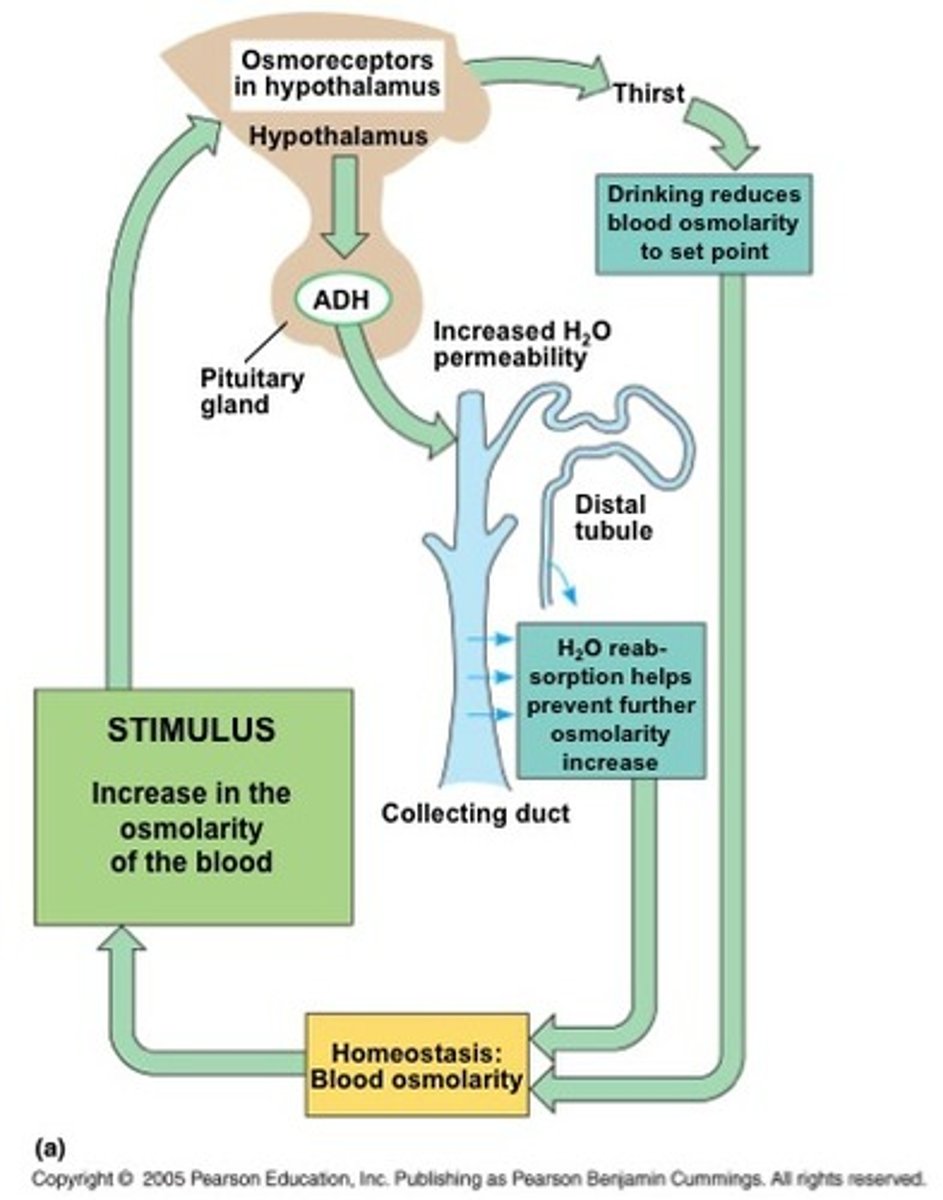Syndrome of inappropriate antidiuretic hormone secretion (SIADH) (Smarty PANCE)
1/13
There's no tags or description
Looks like no tags are added yet.
Name | Mastery | Learn | Test | Matching | Spaced |
|---|
No study sessions yet.
14 Terms
What is antidiuretic hormone (ADH)?
Antidiuretic hormone (ADH) is the hormone that controls water retention in the body. It also constricts blood vessels (the vasoconstrictor drug called vasopressin is just ADH)
How does ADH affect fluid levels in your body?
The less ADH in your blood, the more fluid you excrete and the more ADH in the blood the more fluid you retain

Where does ADH come from and how is it regulated?
Osmoreceptors in the hypothalamus sees this drop in plasma osmolality and tells the pituitary gland to slow down the release of ADH
What test measures the concentration of dissolved particles in your blood or urine?
Osmolality is the test measures the concentration of dissolved particles in your blood or urine
● Diluted urine = low osmolality
● Diluted blood = low osmolality
● Concentrated blood = high osmolality
● Concentrated urine = high osmolality
Osmolality vs. osmolarity?
Osmolarity refers to the number of solute particles per 1 L of solvent, whereas osmolality is the number of solute particles in 1 kg of solvent. For dilute solutions, the difference between osmolarity and osmolality is insignificant.
What is syndrome of inappropriate antidiuretic hormone secretion (SIADH)?
(SIADH) is a condition in which the body makes too much antidiuretic hormone (ADH). SIADH causes the body to retain too much water.
What are the causes of SIADH (increased ADH production)
Anything that messes with the secretion of ADH can cause SIADH
● Strokes, hemorrhages, or trauma to the brain can mess up the brain's ability to release ADH
● Medications that act on the brain like mood stabilizers or anti-epileptics can change the way ADH is released.
● Surgery in general often causes an increase secretion of ADH
● Brain surgery, specifically to the pituitary gland also might cause extra ADH to be released.
● ADH can also be produced ectopically by tumors and release ADH into the bloodstream.
● Small cell carcinoma in the lungs is the type of cancer most likely to release ADH this way.
● Infections in the lungs and brain are also linked to increase the risk of ADH secretion.
How does SIADH effect the body's sodium?
Plasma sodium osmolarity drops significantly. Hyponatremia is the result. The extra fluid takes up more space in our blood vessels which triggers aldosterone to stop being released.
Less aldosterone floating around in the blood causes the body to start dumping sodium from the blood into the urine resulting in high urine sodium.
What are the laboratory findings for SIADH?
Low blood sodium levels (Decreased Na+ <130 mEq/L) and low plasma osmolarity (<270 mOsm/kg) combined with hypertonic urine (high urine osmolality) and high urine sodium is a giant red flag for SIADH
Blood vs. urine osmolality in SIADH?
Urine osmolarity is very high and plasma osmolarity is low
What are the symptoms and signs of SIADH?
When your body has a lower sodium concentration than normal, you experience symptoms similar to dehydration or any other condition where sodium is low.
● Symptoms like headaches, nausea, and vomiting are common initially, along with muscle cramps and tremors.
● As the sodium concentration continues to get lower the neurons in your brain begin to swell leading to cerebral edema and symptoms like confusion, mood swings, and hallucinations.
● If left untreated it will lead to the common downwards trend in most illnesses of seizure, coma, death
Treatment of SIADH?
The best treatment for SIADH is to figure out what the underlying cause of the excessive ADH is, and treat that problem.
● We can manage SIADH by restricting your daily intake of fluid.
● You can also start a high-salt and high-protein diet to help replace the excess loss of sodium.
● Drugs that inhibit ADH secretion can also be used in chronic SIADH situations.
What do we do in very severe hyponatremia?
For people who have really severe acute hyponatremia symptoms, hypertonic IV fluids are usually administered.
What is a complication of correcting serum Na+ too quickly?
Central pontine myelinolysis